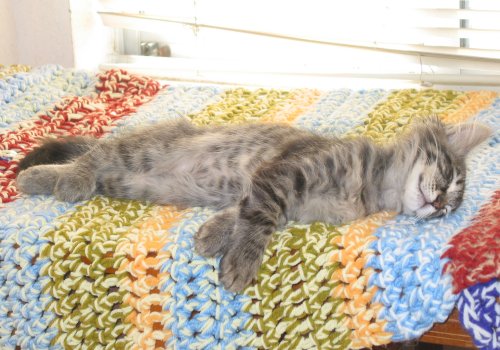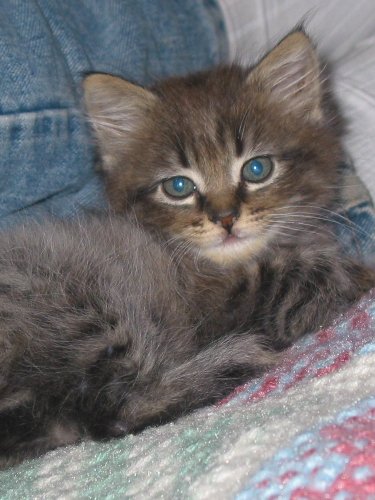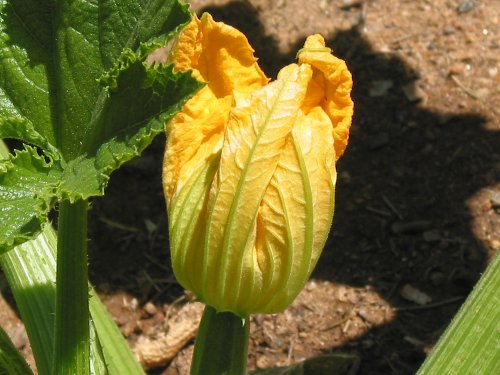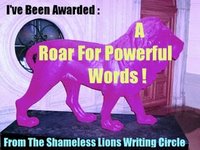July 12, 2008
I almost forgot one of my favorites, a picture of the quintessential Tara — at least when she’s mellow and not stalking whatever prey or toy or window screen is available to do her destructo-cat number on.
This is from two weeks ago when she still had a little kitten fluff —

There’s something about the trust it takes to expose one’s soft underbelly that I admire and love, not just in a cat or dog, but in a person too. That’s why this post is for Bev. We all have a sunny side that we share with people, but sometimes we don’t even realize there are shadows in others’ lives, perhaps not the same shadows we have in our lives, but shadows all the same, and on some level universal. Life is not always sunny and bright, and we don’t always smile, nor should we. Sometimes our shadows need to be shared.
My friend Beverly Jackson recently went through the process of learning where the father she never knew except in shadowy childhood memories was shot down in France, during World War II. She sold chapbooks of her poetry to help pay for a trip to his burial site in France, and the place where his plane went down.
Her story made me realize how lucky I am to know my dad, for one thing. For another it illustrated how kind people can be toward absolute strangers. The people in that small town in France received Bev with open arms. Then Bev graced us all, in choosing to share her personal and emotional experience with even more people, on her blog and in a newspaper account.
I’m grateful for that, because there are some stories meant to be shared, stories we can all benefit from hearing or reading, stories that touch us in places we don’t often think about, stories that make us appreciate life and death in new ways. If you have the chance, I recommend following Bev’s blog journey to France to find her father. The entire photo journal can be found here.
— Barbara @ 10:46 am PST, 07/12/08
May 30, 2008
Mystery author Eric Mayer* mentioned in a recent blog post that his blog journaling hasn’t been very habitual of late. He went on to write about habits, and that got me to thinking about my habits, and how they’ve changed in the past year or so. Obviously, for me, blogging has taken a back seat to other things. So has my fiction writing, other than attempting to sell my latest finished manuscript, a mystery about a tarot reader whose awakening ability as a medium gets her involved in a murder investigation. (Interested agents or publishers are welcome to inquire here.)
Habits can be good or bad, and I’m sure everyone has some bad ones they’d like to unload. But one new habit I’m happy to have taken on this year is gardening.

Gardening is indeed a habit, one that gets into your blood in a way I didn’t anticipate when I started out this year. I’d done a tiny bit of gardening as a kid, when I remember planting one rose bush of my own but mostly helping my grandmother with her strawberries and vegetables on the embankment behind my parents’ house. Later, in my first apartment, I nurtured a few houseplants, and throughout my work life I’ve usually kept a potted plant on my desk. I kept African Violets in a north facing window in the last house we rented, until a cat took over that window sill. Still, my husband did most of the outdoor gardening, with a little weeding here and there on my part, until March of this year.
It started this spring with tending a few vegetable and flower seeds until they sprouted, and then the seedlings until they went into the ground. From there I progressed to caring for plants in the ground and preparing the soil for more of them. It’s rapidly expanding to a succession of all of these things, in the hopes of keeping some fresh produce in our salad and veggie bowls through this summer, as well as brightening a corner of the front yard, where my ultimate goal is to keep flowers blooming in a little cottage style bed year round. I’m a ways from that goal yet.
I’m still new at this, and I got a late start this year, but I get help and advice from various sources, and gardening is now a firm habit that I won’t easily give up. It’s one of the first things I think about in the morning and one of the last I think about before the sun goes down.
The plants seem happy about my gardening habit, when they can figure out what season it is. Our weather this spring switched back and forth for a couple of months from one extreme to the other, first dry Santa Anas with temperatures in the 90s, and then thick cloud cover and a shifting Jet Stream chilled the air to the 50s. This went back and forth for weeks, with little pleasant weather in between, and it kept our plants confused. In the past two weeks the weather has leveled off, and the plants are loving it.
They say beauty is in the eyes of the beholder, and I’ve recently realized there’s little more beautiful to me than a tiny plant bursting out of its seed container. Call me crazy, but I think baby plants can be almost as cute as a kitten, and they, like the kitten, draw out my mothering tendencies.

(I’ll bet you expected a photo of a seedling, but I couldn’t help the obligatory kitten shot.)
To some this pleasure might seem like taking joy in watching paint dry, but to me it’s more like watching a sunset at the end of a heat wave.

We celebrated our first avocado blooms a few months ago.

Now some fruit has set, which we hope will grow to maturity.

Avocados, according to my resident expert Ken who’s read something like 200 online agricultural reports about them, tend to drop a good portion of their fruit early, which can be disappointing to home gardeners. It will be disappointing to me, if it happens, because Reeds are my absolute favorite avocado variety.
Two days ago I celebrated my first squash blossom.

Zucchini may seem an ordinary thing to seasoned gardeners. It’s one of the easiest things to grow and the butt of gardening jokes, usually in reference to an overabundance of it. But I like zucchini, I love my resplendent squash plants with their huge green leaves, and those yellow-orange blossoms are gold to me.

I’m learning more about the various weeds that grow in the garden, some of which are edible. For instance, purslane and dandelion make delicious salad greens. Note, if you decide to try eating weeds from your garden, be careful that you know what you’re eating. Ensure that the plants haven’t been subjected to herbicides or pesticides and that they aren’t in fact toxic weeds.

Even some semi-edible weeds, like the sour grass we all discovered as kids, can be a problem if eaten in quantity, I’m told, and purslane looks very similar to a toxic type of spurge that often grows right alongside it. Have an expert show you how to identify edible weeds, and examine carefully whatever you pick to eat. This point was driven home to me when I found spurge, with its milky sap, growing in my own little purslane patch.
Yesterday Ken pointed me to a Los Angeles Times article about Guerrilla Gardeners, which linked to a slide show on how to make “seed bombs” as well as two blogs, here and here, about guerrilla gardening.
Gardening has not only revolutionized my daily routine. It’s apparently a revolution that’s spreading once again, as Victory Gardens did in the last century, with people today gardening to save money on local food and working on a clandestine volunteer basis to re-green the land.
_ _ _
* In case you aren’t aware, Eric Mayer and Mary Reed’s latest John the Eunuch Byzantine mystery, Seven For A Secret, was released in April by Poisoned Pen Press. If you haven’t kept up with their historical mystery series, it’s not too late to start. The earlier books in the series are still in print, and some are now available as Kindle editions.
— Barbara @ 3:27 pm PST, 05/30/08
March 9, 2008
A few days ago the New York Times ran a story headlined Gang Memoir, Turning Page, Is Pure Fiction, about Margaret Seltzer, alias Margaret B. Jones, and her memoir that wasn’t a memoir at all. She has admitted it was fiction. Today Alternet reports on yet another memoir writer who lied, in Literary Frauds Strike Again … and Again.
So, let’s see if I understand this. We’re supposed to sell our fiction as memoir now? Is that what I’ve been doing wrong? Is this what they mean by creative nonfiction? I’m confused.
I guess the little hand slap mainstream media gave James Frey, not to mention his second book contract, weren’t very good deterrents to the hot new trend in books — memoir fraud.
Readers expect a memoir to be true, if from a limited perspective of the writer’s personal experience and memory of events, which can of course be slightly skewed. We don’t all remember events that happened when we were growing up the same way our siblings or parents remember them. Obviously a lot of other nonfiction is opinion, or facts mingled with theories, presented from a single biased viewpoint. But a memoir isn’t supposed to be deliberately made up and then presented as the author’s own story. That’s called fiction.
These so-called memoir authors sold what they wrote as their own life stories, when they knew the stories either weren’t true or weren’t their experiences. They could’ve called their stories novels, or fictionalized accounts, but they didn’t. They called them memoirs. Some of them (Frey, at least) made a lot of money.
I don’t know about you, but when I spend hard-earned money on a book, my expectations are still pretty high. Those expectations are being fulfilled by books less and less often these days. I’m starting to think it’s no wonder people are reading fewer books, and I think the problem boils down to simple greed.
We all need to make a living. But most of us try to work hard and put in an honest effort at something for our living. We don’t resort to cheating, theft, fraud, and sloppy ethics. So who’s to blame here? Are these people just laughing at all us dummies who bother to actually be honest about our work? Laughing all the way to the bank?
The LA Times has published another opinion on why this type of thing happens in Why we fall for the fakes, an editorial that blames not just the writers, but the publishers, and finally the readers who keep purchasing these books.
What do readers think about this? If you pick up a memoir to read, do you want to know the person is at least attempting to be honest and accurate? Do you want to believe the publisher did their part in making sure they weren’t helping to perpetrate a fraud, or even instigating it? Do you think the writer is making a promise he or she is responsible to keep? Or when you pick up a memoir do you expect a certain amount of fiction?
What do you consider getting your money’s worth from a book? What are your expectations of authors and publishers as far as honesty? Are consumers partly to blame when we keep buying and don’t demand quality and integrity from the companies selling us products? Are we the readers to blame for books that fall below standards in either quality or integrity? Are we voting with our dollar for dishonesty? Or is that just an easy excuse for those who knowingly sell us shoddy or misrepresented products? Isn’t that blaming the victims, something like the purse snatcher saying, “Well she was just walking along the sidewalk. What was she doing there if she didn’t want it stolen?”
Perhaps most important of all, how does this make you feel about telling young people they should read more books?
— Barbara @ 11:40 am PST, 03/09/08
January 7, 2008
We’ve had a few more days of rain, enough to soak the ground, and this storm came before the ground dried out from the last rain, which is good — and unfortunately unusual for us in our past few drought years. So I really shouldn’t complain about the weather, but . . . it’s awfully dark out there.
I balk at turning on lights in the middle of the day, but that’s what I’ve had to do the past two days in order to get any work done. I’m sorting through files, which is a bit scary, especially in the dark. I’ve also hibernated through these dark days to some extent because I’ve been under the weather. We both had the flu over the Solstice and Christmas, and though we’ve recovered, it tried to come back on me a few days ago, sending me once again in search of my vitamin bottles and throat lozenges, and whining about an earache.
It’s a good, wet winter, good for staying indoors and drinking hot beverages, celebrating the fact that we’re actually having winter, even if it is most people’s idea of spring or fall. The more wet winters we have, the less likely we are to have such horrible fire seasons.
Meanwhile, because I’ve decided to keep politics mostly off this blog, whenever I get the urge to wax political I post my views at my other blog, Spirit Blooms. I am putting my political blogging efforts into support of Dennis Kucinich for President.
Don’t worry, I haven’t given up this blog, and I don’t intend to. I’m still somewhat of a mystery to me, and I intend to keep writing, even if not mystery novels. I’m also still opinionated and have lots to say about writing, books, and lots of other stuff you might find interesting. Mystery of a Shrinking Violet will live on until the bitter end of my blogging adventure, whenever that is, sometime in the far future. I’ll be back in a day or two, hopefully with more to write about than the weather — or politics, which I honestly hate but can’t avoid in good conscience these days.
— Barbara @ 11:21 am PST, 01/07/08
November 30, 2007

Bev Jackson has awarded me the Shameless Lion Award. This award originated with Seamus Kearney of (more…)
— Barbara @ 1:40 pm PST, 11/30/07
September 27, 2007
I was thrilled a few weeks ago to be asked to contribute some of my thoughts about blogging to a project called, Blog Your Book to the Top. It’s an ebook published by CyberBookBuzz to help authors use blogs to promote their work.
What little I know about that apparently went over well, so I’m one of the 15 authors whose blogs and tips are featured in the book. You might want to take a look, if only for tips from others who know far more than I do about using a blog to promote their work. Nancy Hendrickson, who asked me to take part, is a freelance writer in San Diego and creator of Blogging Authors and Book Talk Radio. She’s included dozens of great tips about author blogging, and blogging in general, in Blog Your Book to the Top.
One of my particular thrills resulting from this project is to see my name on the summary page for the book — on the same page as a blurb by Jessica Macbeth, author of The Faeries Oracle. Her excellent book accompanies Brian Froud’s Faeries Oracle cards, which I love so much that after I lost my first deck last year I immediately bought a second one.
How cool is that?
— Barbara @ 10:59 am PST, 09/27/07
September 20, 2007
Bruce at Wordswimmer writes about story endings in his post, Where the River Ends, and that got me to thinking about some of the problems I’ve encountered in ending mysteries.
With a mystery, the question of how to end the story begins with which character did the crime. I no longer start with a specific villain in mind. The story often changes so much in the writing that a pre-planned ending has no choice but to change as well, or it wouldn’t make much sense.
In the last couple of mysteries I’ve written, I was as surprised as anyone by who the villain turned out to be once I got to the second draft or later. That’s okay, and it has a lot to do with how I develop characters. If I know who the villain is too early, I’m in danger of giving it away, offering hints I’m not even aware of because of my judgments about that character.
If I start out thinking the villain isn’t a villain, I can get to the heart of that character sooner in my own mind. I can get to know him, let him grow and round out on the page. I’m an idealist, and I really like to see the best in people, so there needs to be that spark of sympathy first, without letting on even to myself that he or she is a killer in the making. I guess in that regard my characterization is as organic as raising a child. What mother imagines her infant would harm anyone?
This process forces me to explore the shadows, my characters’ shadows as well as my own, to see possible motivations, both conscious and unconscious.
I first encountered the shadow, as a human concept, in stories I read. I confess that I didn’t understand the concept very well when I was young and still in denial that I had a shadow or that any good person did. But one encounters this idea many times, if one reads at all widely, and the reason for that is it’s a universal truth about human nature.
In exploring the shadows, I’ve come to see that a fully rounded character, even if he’s the good guy, has a shadow, whether that shadow is clear on the page or not, whether that shadow is negative or positive. I want to know each major character’s background as well as possible, so I start with the positives and work my way into the negatives. Though it hurts me to watch a character I’ve come to like or sympathize with cross the line into murder, at least the biggest puzzle of the mystery isn’t lost on me, and I’m not giving the killer away up front. If I decide the murderer needs to be someone else, not the person I thought it was going to be, I don’t have to cast about too far for someone else who could have done it. In truth, any one of the characters might be capable of killing, given the right circumstances and motivation. They all have their shadows. By the time I get to my final draft, I usually have a few characters that, with nudges into poor choices and flawed rationalization, could become much darker individuals. That’s usually a key to how I end the story. Which character, which nudges, and which choices? Which fits this need best? What motivates the villain to do the awful deed and also causes him or her to get caught in the end? How will the reader be surprised and at the same time see that this person and the clues leading there were present all along? (Foreshadowing will have to wait for another post.)
My exploration of the shadows has made me think a lot about the choices we make in life, and how important each one is, especially when we stack one choice on top of another in the way that we sometimes come to think of as inevitable. We don’t have a choice in everything, certainly, but sometimes when we look back over our lives or a course of events, we can see the turnings we’ve made, and many of them were choices, that brought each of us to be who, where, and what we are today. When we’re accountable for those choices, I think we improve our ability to move forward and make better ones.
If there’s one positive effect fiction can have, perhaps it’s to get us to take a look at the cause and effect of choices. What are we capable of? What would we do in the same situation, and where might that take us or what might it make of us, and our world with us? The stories that get me to think in those terms are the stories that stay with me.
— Barbara @ 1:13 pm PST, 09/20/07
August 14, 2007
I hate writing synopses.
As I understand it, most writers hate them. It’s difficult to pare down to a few pages the story that took you many hundred more to write in the way you think readers will best understand. It’s especially difficult for me while all the minute details and nuances are still very much alive in my mind. But agents want to see a synopsis first.
Some writers say a synopsis is easier to write before one writes the story, but I’ve always found that tricky, since my stories change as I write them. I outline the story that it turns out I didn’t want to write after all. The real story reveals itself as I go along.
But this synopsis may turn out to be a good thing, because it’s helped me see more that I want to cut. Maybe that’s what the agents really have up their sleeves, getting writers to analyze their stories from a different perspective. I’m heading back into editing mode. Good grief, this novel’s been through a lot of drafts. This will be the 9th, and it’s wearing me down. I’ll be glad to see the end of it.
— Barbara @ 2:15 pm PST, 08/14/07
July 9, 2007
Gloria Steinem: In Defense of the ‘Chick Flick’:
“I propose, as the opposite of “chick flick,” films called “prick flicks.” Not only will it serve film critics well, but its variants will add to the literary lexicon.” (read article)
Maybe the term “prick” is too strong. It’s not the word I would’ve chosen, yet it answers the fact that a lot of women are put off by the tone and expression, if not the word, used when we hear the term “chick flick.”
Steinem’s editorial reminds me of something that occurred in a “Modern Fantasy” literature class I took, back in the seventies, when Mary Stewart’s first two Merlin and Arthur novels, The Crystal Cave and The Hollow Hills, were recent bestsellers. One of the young men in the class was so taken with them, he asked what other books Mary Stewart had written. I told him she’d written mostly romantic suspense in the past. I had an entire collection of her books at home, older hardcover editions gleaned from thrift store shelves. I thought when he expressed an interest that here was another new fan. But when the young man heard the word “romantic,” he took on a look of utter distaste and lost interest.
Some female mystery novelists still publish today using their first and middle initials rather than their full first names, in order to stretch past that still-existent gender barrier in many male readers’ minds, a practice reminiscent of the Brontës publishing under masculine names. One would’ve hoped that by the time this century rolled around we’d have advanced further. I don’t have statistics on this, but I’ll hazard a guess that there are more women who read and write fiction containing a predominately masculine point of view than there are men who read or write fiction containing a predominately feminine point of view.
Yet I know women, myself included, who enjoy a good action film, of the type once considered a favorite of men. Why is it that women, both in their reading and writing, as well as in movie preferences, might more readily cross old gender barriers?
Mind you, many men do take an equal interest in less violent or less action-oriented movies and books, and I admire men who are open to genres and interests considered historically feminine. I also admire women who open up more to interests previously considered masculine. More women today are sports fans than ever before, and don’t restrict their interests, as I do, to figure skating. My lack of interest is mostly due to bad experiences in physical education classes — I was that awkward, non-athletic kid always picked last for the team. It has nothing to do with my admiration of any outstanding achievement, physical or otherwise, and I enjoy watching good sports-related movies.
What is it that continues to keep some men from enjoying what they term as “chick flicks?” Is it that they truly don’t enjoy more thoughtful, slower-moving, or less action-oriented stories, once they give them a chance? Or is there another reason? Is it adrenaline addiction? (Understandable, among men and women, in today’s world, though perhaps best not encouraged.) Is it fear of what their friends will think? I’m trying not to make assumptions here. I’d really like to know, especially as a female writer trying to sell my fiction.
We all have types of stories we don’t like, or even parts of movies we like that we could do without. I personally back away from anything about child abductions, gangster movies that are overly violent onscreen, comedies that resort to tasteless bathroom humor (bathrooms have doors for a reason), and horror with too much blood and gore added for shock value. As far as I’m concerned, vomit and excrement belong off-screen. There’s enough of them in real life, and they’re not entertaining. They’re certainly not the kind of realism I’m looking for in a story.
I can understand someone not liking romance, even though I usually enjoy it provided it’s not overly sappy. But no one’s personal preference for certain types of stories and not others explains why we need the term “chick flick,” and especially not why it so often seems to be used as a derogatory term. Do the men who don’t like “chick flicks” prefer movies with only men? Is that what it boils down to?
I’m reminded of a line from Frank Herbert’s Dune regarding taking the “waters of life.” It mentions the place in their minds the Bene Gesserit mother superiors (women) fear to go, a place they believe only the fabled Kwisatz Haderach (a man) can access. The Kwisatz Haderach, once he accesses that place, becomes a superior being destined to lead his people to freedom. I wonder about the allegory Herbert intended, if any. Is there a place like that inside the female psyche, where some of the toughest men fear to go? Is that what they fear about “chick flicks?” Will they gain power if they find a way to access that, or will they lose power, possibly even die, as many men did who attempted to become the Kwisatz Haderach? Or will they simply gain a broader understanding of life and the world around them? In that case, maybe it’s worth a shot.
Gloria Steinem makes an interesting observation about power, and about nouns and adjectives in labels:
“Just as there are “novelists” and then “women novelists,” there are “movies” and then “chick flicks.” Whoever is in power takes over the noun — and the norm — while the less powerful get an adjective. Thus, we read about “African American doctors” but not “European American doctors,” “Hispanic leaders” but not “Anglo leaders,” “gay soldiers” but not “heterosexual soldiers,” and so on.” (read article)
— Barbara @ 1:35 pm PST, 07/09/07
July 5, 2007
I decided to answer your comments in a new post, since some of my responses are lengthy. You’ve given me a lot to think about and helped me reconsider my feelings about critiques. Even though I disagree with some points, as they relate to my writing at this time, you all shared wisdom that deserves attention. (more…)
— Barbara @ 7:33 pm PST, 07/05/07












